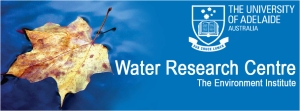Water Wednesday: Unconventional Gas - where to from here?
 The Water Research Centre in conjunction with SA Branch of the Australian Water Association would like to invite you to the next Water Wednesday entitled: Unconventional Gas- where to from here?
The Water Research Centre in conjunction with SA Branch of the Australian Water Association would like to invite you to the next Water Wednesday entitled: Unconventional Gas- where to from here? The global demand for energy will drive the exploitation of numerous forms of fossil fuel. Australia is well placed to supply some of these resources including currently explored unconventional gas. Unconventional gas includes shale gas, shale oil, coalbed methane, tight oil and tight gas, all classified as ‘natural’ gas or derivatives.
The media has highlighted concerns surrounding the extraction of some of these unconventional gases, particularly with respect to impacts on water resources. Are the risks real or perceived and how is the industry moving to mitigate these risks?
This forum will explore past learnings, current knowledge and future options for the sustainable management of alternative energy sources while ensuring minimal impact on water resources.
Guest Speakers:
- Finding and Developing Unconventional Gas Sources
Professor Martin Kennedy is the director of the Sprigg Geobiology Centre at the University of Adelaide. His research centres on the mechanisms and influence of carbon burial on the biogeochemical cycles of earth and its implication for the biosphere. He has 15 years of experience with hydrocarbon producing shales that comprise a broad class of unconventional gas systems dating back to the beginning of the gas shale revolution in the USA as a senior research geologist at ExxonMobil and extending to his present lead of an ARC - Industry supported consortium focused on improved prediction of gas shale distribution. His recent work is exploring another aspect of the unconventional boom, the potential effects on greenhouse gas contribution of fugitive emissions of methane lost during drilling operations. This work brings data from new, highly sensitive trace gas measurement equipment to the unconventional debate, placing these operations in context with other sources of methane produced by industrial and agricultural activities. Before returning to Australia in 2010, Martin was Professor of Sedimentary Geochemistry at the University of California and director of the Graduate Program for Global and Environmental Change. He has published extensively on the carbon cycle, biospheric triggers for animal evolution, and geologic mechanisms influencing climate change. Martin will provide a general geologic background of unconventional reservoirs and how they differ from standard oil and gas plays, what potential resources exist in South Australia and trends in shale gas development in the USA, and discuss the potential effects of fugitive emissions on sustainable development
- Finding Innovative Solutions for Viable Gas Extraction with Minimum Impact
Colin Cruickshank has over 29 years oil and gas exploration and production industry experience in a variety of technical and leadership roles, including drilling and completions, facilities, business planning, project engineering, reservoir engineering, producing operations and development planning. His current role is General Manager Unconventional Resources and Exploration for Santos’ Eastern Australia Business Unit where he is responsible for the exploration and appraisal of Santos’ onshore assets in South Australia, Queensland and Northern Territory for both conventional and deep unconventional hydrocarbons including shale and tight gas.
- Unconventional gas and groundwater: Challenges and Opportunities
Professor Craig Simmons is Schultz Chair in the Environment at Flinders University and Director of the National Centre for Groundwater Research and Training (Australia). One of Australia’s foremost groundwater academics, Professor Simmons has been a significant contributor to global advances in the science of hydrogeology for many years and has published widely in areas including variable density groundwater flow, surface water - groundwater interaction, fractured rock hydrogeology, aquifer storage and recovery, and groundwater flow and solute transport modelling. He is a member of the Statutory Independent Expert Scientific Committee on Coal Seam Gas and Large Coal Mining Development. His work has been recognised by numerous national and international research and teaching awards including the Anton Hales Medal for outstanding research contributions to the Earth Sciences by the Australian Academy of Science. Professor Simmons has served as an Editor and Associate Editor for numerous major international journals including Hydrogeology Journal (Editor), Water Resources Research, Environmental Modeling and Assessment, Journal of Hydrology, Groundwater and Vadose Zone Journal.
When: Wednesday 18th June 2014, 5:30pm - 7:00pm
Where: The Braggs Lecture Theatre, North Terrace, University of Adelaide.
Registration Essential by 16th June.
Please be seated by 5:30 pm.
There will be an opportunity for networking afterwards.
Download the Water Wednesday June 18 Flyer.
Download the May 2014 Water Research Centre Newsletter.

Newsletter & social media
Join us for a sensational mix of news, events and research at the Environment Institute. Find out about new initiatives and share with your friends what's happening.
